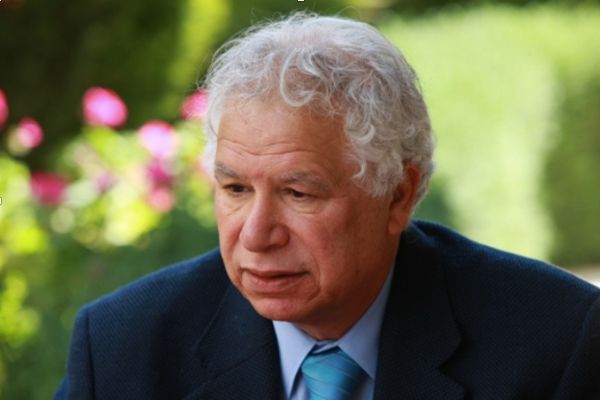Celebrating Palestinian Poet And Novelist Mourid Barghouti

The renowned Palestinian poet and novelist Mourid Barghouti died on 12 February 2021, at the age of 77 in Amman, Jordan.
He was born in the village of Deir Ghassaneh, near Ramallah, in the occupied West Bank in 1944, 4 years before the State of Israel came into existence.
In 1963, Barghouti travelled to Cairo to study English Literature. After Israeli authorities occupied the West Bank in the 1967 Middle East war, they banned him from returning back to his village near Ramallah.
Barghouti spent most of his life in exile in Egypt, Hungary, Lebanon and Jordan.
Wherever he was, under whatever circumstances, he wrote poetry. "I gave everything to poetry, which is the centre of my life. All my travels, writings and readings are about poetry,"
Barghouti published 12 poetry collections. Some have been translated into English.
In 1993, after the peace agreement signed between Israel and the Palestinian Liberation Organisation, he was able to return briefly to his birthplace.
The visit led to Morid Barghouti's writing his autobiographical novel I Saw Ramallah.
This book in particular, sharing the sadness and longing of a life in exile, has struck a chord with readers around the world as it 'humanises' the Palestinian people, what they have had to, and continue, to endure for so many years.
Barghouti's death will be mourned by many people, Arabic speakers and Arabic Studies students. Poetry is a valued cultural tradition, that goes back many, many years.
A year or so ago, a few friends got together in Christchurch to share quotes and short readings from Palestinian writers. I prepared this little excerpt, for two of us to read out.
I SAW RAMALLAH by MOURID BARGHOUTI
Imagine being 23 years old, studying literature in a foreign country. Your country is at war. The war ends. Your side is defeated and you are not allowed to return home. You are stateless, moving from city to city, not knowing where you belong.
“They call us the displaced ones. Displacement is like death. One thinks it only happens to other people.”
After 30 years, you can return. You won’t stay long because your son is not permitted in. What are your thoughts while waiting for permission to cross the bridge into the other side? Maybe, in all honesty, you don’t romanticize your home.
“I asked myself, what is so special about it except that we have lost it” It is a land, like any other land.”
Maybe you think of your grown son and his generation,
“Generations that never planted or built or made their small humble mistakes in their own country. Generations that never saw grandmothers squatting in front of the ovens to present us with a loaf of bread to dip in olive oil..”
And when you are finally allowed to cross over the river, you see that “they” are still in charge, and you see modern roads that you cannot travel on, leading to huge houses where “they” live.
What is life like under Occupation?
“True, life was not paradise before.”
People say this and then someone adds,
“But the Occupation..”
And then he falls silent. Occupation prevents you from managing your affairs in your own way. It interferes in every aspect of life and death; it interferes with going anywhere and coming back, with going to market, the emergency hospital. And politics is ever present.
“Politics is the family at breakfast, who is there and who is absent and why. Who misses whom when coffee is poured into the waiting cups.”
You learn of the destruction of olive groves, a cruel blow, a kind of cultural genocide, for traditional culture revolved around the olive.
“Olive oil is the gift of the traveller, the comfort of the bride, the reward of autumn, the boast of the storeroom, the wealth of the family across centuries.”
You have come home but things are not the same. And now you must say goodbye to your mother.
“Can the earth contain the cruelty of a mother making her coffee alone on a Diaspora morning?”
If we Westerners were introduced to Palestinian writers and poetry, we would see the situation in historic Palestine in a different light.


 NZDF: New Zealand Warship Links Up With UK Carrier Strike Group For Combined Operation
NZDF: New Zealand Warship Links Up With UK Carrier Strike Group For Combined Operation  Greenpeace: Urgent Action Needed At SB62 As Amazon, Climate Slip Closer To Tipping Points
Greenpeace: Urgent Action Needed At SB62 As Amazon, Climate Slip Closer To Tipping Points UNICEF: Statement By UNICEF Executive Director On The Children Killed By The Alarming Escalation Of Violence In The Middle East
UNICEF: Statement By UNICEF Executive Director On The Children Killed By The Alarming Escalation Of Violence In The Middle East Big Shift Global Campaign: The World Bank Is Making Bad Economic Decisions | U-Turning On Its Energy Policies
Big Shift Global Campaign: The World Bank Is Making Bad Economic Decisions | U-Turning On Its Energy Policies UN Department of Global Communications: FAO Releases The Most Detailed Global Assessment Of Marine Fish Stocks To Date
UN Department of Global Communications: FAO Releases The Most Detailed Global Assessment Of Marine Fish Stocks To Date World Economic Forum: Gender Gap Closes At Fastest Rate Since Pandemic
World Economic Forum: Gender Gap Closes At Fastest Rate Since Pandemic